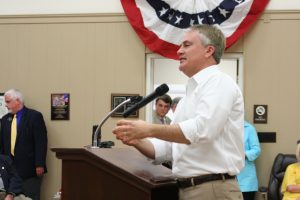








The atmosphere was, at times, tense as constituents gathered from around the first congressional district of Kentucky to participate in a town hall meeting with U.S. Rep. James Comer (R-Ky.) Wednesday at the Marshall County Courthouse in Benton.
Comer, a freshman congressman elected in November to serve out the unexpired term of former Congressman Ed Whitfield in special election and in the general election, met with residents to address pressing issues in Washington, D.C. Health care, and concerns surrounding the under-rewrite GOP proposed American Health Care Act, by far dominated discussion for the day.
Comer, who acknowledged he’d taken criticism for voting his approval in the House last week that took place before a CBO analysis on the potential cost and impact on citizens had been released, said lawmakers had little choice in passing the bill.
“Whether you support the Affordable Health Care Act, or Obamacare, however you want to call it or not, I hope that we can agree on one thing: The individual insurance market in Kentucky is collapsing. There are 35 counties in the first congressional district; 31 of the 35 counties only have one insurance carrier. In Virginia and Iowa, two weeks ago, those rural counties that only had one carrier, that carrier announced that they weren’t going to cover those counties in 2018. So those rural counties don’t have any carrier to cover them. I think we’re going to see more of that if a health care bill is not passed.”
Comer said constituents needed a bill that would protect its most vulnerable residents – those with pre-existing conditions and those on Medicaid – but would lower premiums and deductibles. He said he voted for the bill because he felt it would do those things. Still, some concessions had to be made.
“We have 30 percent of our population on Medicaid,” Comer said. “When Obamacare passed and Gov. Beshear created the KyNect and the exchange, he expanded Medicaid. And when people got on KyNect, over 80 percent of them ended up on Medicaid. Most of those would not have met the Medicaid requirements before Obamacare. In the first three years, that was a good deal. … But after the first three years, the state starts having to pick up the tab for that Medicaid expansion, and guess what? It’s been three years. … To pay for health insurance – 10 percent of the health insurance bill for almost half a million people in Kentucky, that’s a budget breaker for the Kentucky General Assembly.”
Comer said he supported the core concept of Medicaid, which was to provide health care assistance for poor children, low income single parents and pregnant women and the “truly disabled.” Comer said many had taken advantage of the system, however.
Comer said the bill he supported was designed to reduce premiums and deductibles, which he said was not likely under the current model without incentive for companies to provide coverage to all areas. The biggest dog in the fight, however, involved concessions on pre-existing conditions, he said. Comer told attendees that the bill failed on its first run several weeks ago because ultra-conservative Republicans wanted complete ACA repeal, while others wouldn’t budge on protections for pre-existing conditions. Comer said the House bill that passed included amendments to establish more than $130 billion to set up high-risk pools to help states cover those most expensive to insure. The bill prohibits insurance companies from denying coverage based on pre-existing conditions; companies may not increase rates for those clients. However, companies may increase rates on those with pre-existing conditions if they do not maintain consistent coverage.
“The bill … takes the best part of Obamacare, the protection of pre-existing conditions and creates a system that where premiums will hopefully go down and more competition will come into the market,” Comer said.
Many constituents disagreed, however. Some lay on the courthouse lawn prior to the meeting with tombstones at their heads and feet and signs that read “I had a pre-existing condition.” Those constituents and more voiced their concerns on clauses in the bill that would allow states to apply for a waiver to those requirements on insurance companies.
Jennifer Smith, a two-time cancer survivor from Paducah, said she feared what would happen under the bill for those with pre-existing conditions. While the legislation, as it was passed in the House, prohibits insurance companies from denying any applicant with pre-existing conditions, it allows states to apply for a waiver to those requirements.
“You stated your commitment to protecting all of us with pre-existing conditions, our access to insurance and health care but instead on May 4 you reneged on that promise and voted for the horrendous bill the AHCA,” Smith said. “In response to the outrage from your constituents you stated on your Facebook page that the bill protected pre-existing conditions and that those protesting and distorting the truth were far left liberals like the DNC and Planned Parenthood. … The radical left wing organizations that you say are against you include the American Cancer Society, Komen, the National Patient Advocate Foundation and over 25 other cancer and health advocators, the American Medical Association, the American Nurses Association … and the AARP have also come out strongly against the bill. All the organizations have cited the catastrophic impact this will have on those of us pre-existing conditions and every other consumer of health care.
“You distort the impact of the bill by saying that high risk pools will protect us,” Smith added. “That would have some truth if the funding of the bill was anywhere near what would be required to have the high-risk pools be functional. The funding would only cover approximately 110,000 individuals with pre-existing conditions, however, there’s an estimated 2.1 million people in this country with pre-existing conditions. So what happens to us? You also neglect to mention the states have the right to opt out, so that’s almost a certainty that Kentucky’s Gov. Bevin would take that option. … The reality is that this bill will drive up cost for the poor and those with health issues to the point that there is no access, because we will not be able to afford to pay the premiums or out-of-pocket expenses. This is a simple grammar lesson: Just because we may buy health insurance doesn’t mean we can.”
Marshall County native Randy Gray – son to former state Rep. J.R. Gray – shared his concerns. Gray was diagnosed with Common Variable Immune Deficiency (CVID) at 5 years old. The disease makes him highly susceptible to infections and bacteria, and is highly expensive to treat. Gray receives a shipment each month of two medications – four once weekly dosages – that total about $13,000 a week, he said. While Gray is retired and has insurance for life, he said before the implementation of the Affordable Care Act his medical expenses were close to reaching his $1 million per year cap, leaving him fearful he would exceed that limitation.
“Before the Affordable Care Act nothing was being done at all,” Gray said. “At least we took a step forward with that. Whenever the Affordable Health Care Act was passed, my maximum cap was $1 million. I was at $780,000, I was getting really close, and I wasn’t even on that medicine at that time. … This is really an emotional issue for me. It’s something that’s hard for me to understand how the cruelty is that my wife and I might be looking at if we lose insurance. … It makes me really worried that I’m not going to have any because of what all is going on, and what I hear more about than anything is about tax breaks for the rich. I don’t hear anything about taking care of me.
“Whenever I was diagnosed it was very, very rare,” Gray added. “But today they say one in every 20,000 have an immunological disorder. I know four people in western Kentucky that has to use a pump just like I do. It’s a struggle. But I don’t wear this on my sleeve, I live my life. I own my own business. … It worries me that now I feel like I can’t sleep at night, not knowing if this $13,000 at four times a month is going to arrive by UPS for me to stay alive. … One thing I want you to remember more than anything is that whenever you’re in D.C. It’s easy to remove yourself from here some times and you forget. But whenever you go to cast your next vote, I want you to think about people like me … I didn’t ask for this. Believe you me, I’d rather be like you and in perfect health. So, I would just appreciate when you go to D.C., you think about me whenever you’re casting your votes, ’cause I’ll be thinking about you.”
Comer stressed, again, his concern for those with pre-existing conditions, saying the bill as it was written alloted states federal money for high-risk pools, to help cover those most expensive to insure. Comer said he felt it was a misconception that the bill left those with pre-existing conditions out to dry, and that the bill was more complex that what many realized.
“The bill does cover those with pre-existing conditions,” Comer said. “… The high-risk pools, if it came to that, are very funded. Kentucky still has a funding mechanism that other states don’t. They don’t have to worry about getting the General Assembly to pass … it’s already in there. When Obamacare passed, then Beshear used that to pay for the exchange and things like that. So there’s a funding mechanism on top of the budget. And then the fifth and final amendment … increased the high risk funding an additional $8 billion on top of what was already funded. If 20 states apply for the waiver, that’s – you split that – that’s an enormous amount of money to pay for pre-existing conditions. … Here’s the bottom line, if nothing is done, people with individual insurance plans and group plans are going to continue to have to pay more and more insurance costs and it’s just putting people (where) they’re choosing health care costs over food. They’re not buying medicine because they’re spending all their money on health care premiums.”
Others argued that government interference had been the root of the problem in the first place. Michael Gordon, a nurse practitioner and former insurance agent from Marshall County said health care would be better left in the hands of the people.
“Regardless of the pre-existing conditions, we’ve got to do something about that, I understand that,” Gordon said. “But we need to get back to a catastrophic plan so that we’ve got an 80 to 20 rule, $1,000 deductible, and let people worry about their primary care, let them worry about their own dental insurance or their own dental plan or their eye care plan. We need to get back to where people have skin in this game. It’s ridiculous to think that you can get a Cadillac plan on a Yugo budget. As a congressman, I don’t know exactly what you can do … the way I see it, we don’t have a health care problem, we’ve got a payer problem. And it’s not the health insurer’s responsibility to pay for somebody’s surgery, it is your responsibility for your health care. … If you went out here and started mandating that Farm Bureau pays for tires and oil changes and wiper blades, how much would my premiums go up? They would skyrocket. … We’ve got get away from this thought that health insurance is health care, it’s not. As a provider I can tell you that’s not the problem. The problem is government meddling into our business.”
Marshall County Republican Party Chairman Danny Holt said he thought Comer presented himself well, despite those in the crowd who he said would not accept facts.
“I was very pleased at the way the Congressman handled himself with the things that were thrown at him, and the things that some of these people that just follow him around and try to trip him up and make him look bad,” Holt said. “They’ve got an agenda, and I was very pleased at how the congressman conducted himself and answered the questions and came across in a hostile environment here. … The congressman has continually provided the information on his Facebook posting and town hall meetings, and they just refuse to accept any of it.”
Comer briefly touched on other issues in Washington, D.C., including the Tuesday dismissal of FBI Director James Comey, but Holt said he wished there would have been time to discuss additional issues.
“Take note that it was not a lot of Marshall County people here that got to ask questions,” Holt said. “There were a lot of out-of-town people that kept running their mouths. … I wish that we could have gotten into more things other than the agenda of the health care that these people have. He mentioned in the beginning that he was there trying to do the things that would help create jobs and set up a better job environment in Washington, D.C., to help out with jobs here. He didn’t get to talk about that, they wouldn’t let him.”
Comer will next travel to Clinton County for a town hall meeting scheduled at 3 p.m. today in Albany.
